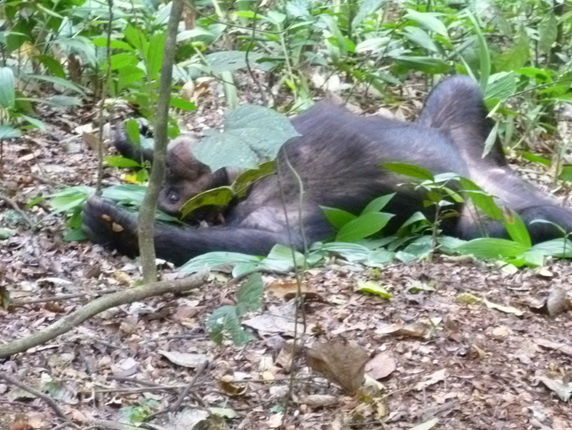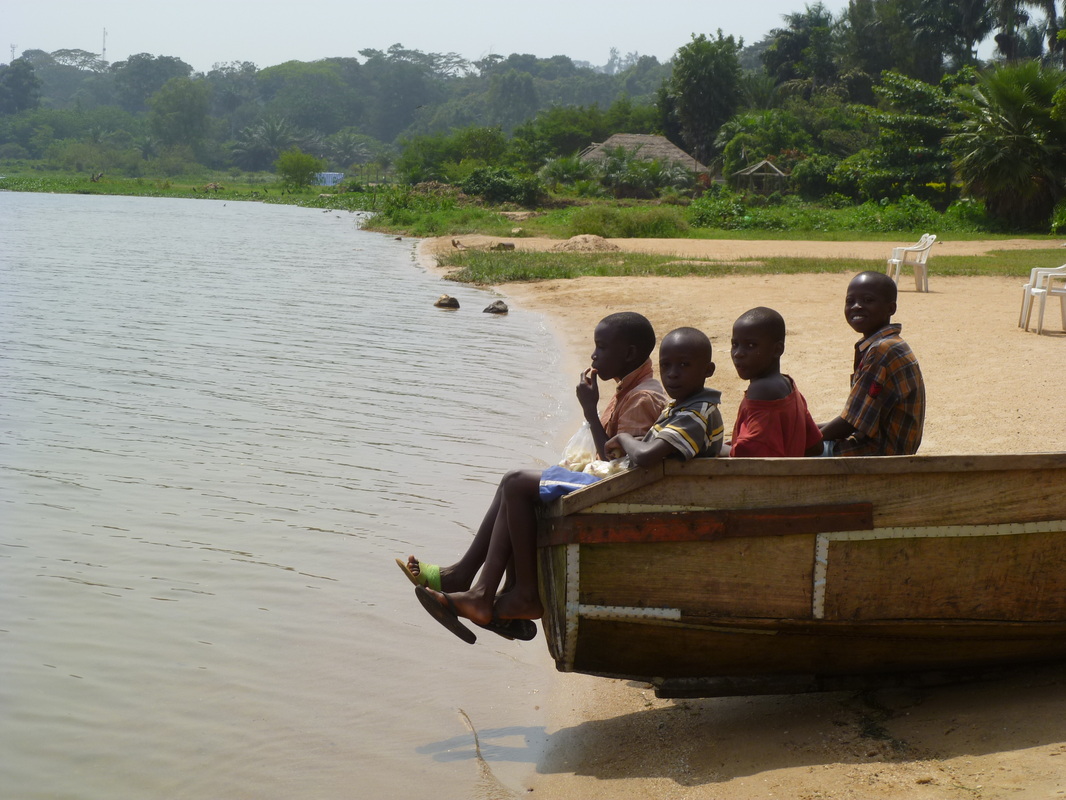|
The first thing I noticed in Uganda’s Kibale National Forest Park was the abundance of butterflies. It looked like petals were falling all around us, a shaken bouquet of iridescent pale blue, lime green, lucid white, pink-spotted, bright yellow, and deep black wings. Everywhere they fluttered.
If a forest is home to so many different butterflies, I thought, what other marvelous, mysterious creatures live here? We had come to track Kibale’s most famous residents: chimpanzees! It’s hard to write chimpanzee without an exclamation point, they are so exciting. I never imagined that I would get to see them--humans’ closest genetic relatives, along with bonobos--in the wild. Yet my guidebook informed me that Kibale is one of the best places in the world to encounter them. Here, amid 351 species of trees and 12 other types of primates, a group of chimps has been habituated to human contact. An experienced tracker can find them about 90 percent of the time, and every day tourists get to spend one hour in their presence for a fee of $150 per person. Our guide was named Ronald. He is Ugandan and has been tracking chimps for 14 years. “They know me well,” he said. He led us up a red road into the park, and then he turned sharply left into the forest. Suddenly we were surrounded by tall trees, strangler figs twisting up trunks, vines cascading back to the earth. Everywhere it was green, but not so dense that we couldn’t make our way. We heard thunder rumbling. After about a half hour of hiking, Ronald turned around and said, “They are here.” We walked a few more steps, and only ten feet away a chimp was stretched out on the ground on its back, an arm hanging lazily above its head. It looked so relaxed, so languorous and at peace. It was taking an afternoon snooze. The chimp glanced in our direction and then looked away, not caring. It was the most beautiful thing to see this animal in the wild, so fully at ease. Several other chimps were in the distance, some sitting, some picking at leaves, some lying down. The alpha male sat not too far away, looking ominous. A tourist got too close and the male suddenly swung a branch in the air. She had violated his space, and he was demanding respect. This chief chimp moved deeper into the forest, and one by one the other chimps followed, using all four limbs, quickly and smoothly. We slowly walked after them, sometimes losing sight of their dark bodies in the shadows and thick of the jungle. Then we came upon a solitary chimp resting its back against a tree trunk, looking around slowly, quietly, meditatively. Perhaps somewhere way, way down the silly strings of this chimp’s DNA lies a genetic tie with Henry David Thoreau and his Walden. We belong in nature, too, I thought. Before our hour with the chimpanzees(!!) had ended, we reached the park’s “grasslands,” which was really a mass of vines and thorny branches tangled with tall stems. Ronald wanted to press on, to see the chimps one more time. “I must try,” he said. So we tumbled through a green vortex, with the jungle grabbing at our legs and arms, leaving us pin-cushioned with pokey seedpods. We were rewarded with an amazing view: a chimp crouched just a few feet away, employing his big strong arm and dexterous fingers to delicately pick something tasty off a plant. So much power used with so much grace.
3 Comments
In front of me is the wide mouth of the Nile River, where it pools out from Lake Victoria near Jinja, Uganda, and begins its very long journey all the way to Egypt and the Mediterranean Sea. The opposite bank is pressed and folded with cultivated fields, as I imagine it’s been since humans first started farming along the Nile thousands of years ago. On our bank, which I can see from our hotel balcony, long wild grass wades into the water. I’ve seen gray herons and white egrets disappear into the blades.
The two palm trees in front of me squeak and squawk with bats. Hundreds of them have come to sleep away the hot day underneath the collapsed leaves near the trunk. I’ve watched them fly unsteadily into the branches, latch on, and then use their hook-like elbows to climb into the shade. They look like discarded rags that have wiped away the night. Now the bats have disappeared, and I imagine they’ll swarm out again at dusk. I like bats, a sort of underdog of the winged world. I can hear them in the trees, settling domestic disputes and cracking jokes with noisy uproars and then more gentle, Gremlin-like coos. These are Nile River bats, and they must have special bat status because of their location. There is probably a hierarchy for who gets the most cool, comfortable spots in the trees. So far, I have loved being in Uganda. Everywhere you look here something is green and growing. Along the side of the highways, there are red and purple flowering trees, huge stretches of tea bushes, groves of evergreens, and hundreds of other plants that I don’t recognize. Many of the trees look ripe for monkeys, and I’ve spotted a few in the highest branches. I’ve also seen truckloads of green bananas, piled in gigantic bunches like a meal for King Kong. He probably retired here. I cannot blame Mr. Kong--the people of Uganda are some of the politest I’ve ever met. It is bad manners to have any conversation without first saying, “Hello! How are you?” And then you must genuinely listen to the answer and perhaps offer a handshake. Only then can you ask, “How much for a bottle of water?” This is the same case when you relate to the boda-boda (motorcycle taxi) drivers. You cannot just go up and say, “How much to go to the pharmacy?” You must first find out how the driver’s day is going. This makes every single exchange feel just a tad deeper, just a bit more in touch with the fact that we’re all people, not just bats fighting for a better spot on the palm tree. |
Archives
July 2012
Categories
All
|


 RSS Feed
RSS Feed